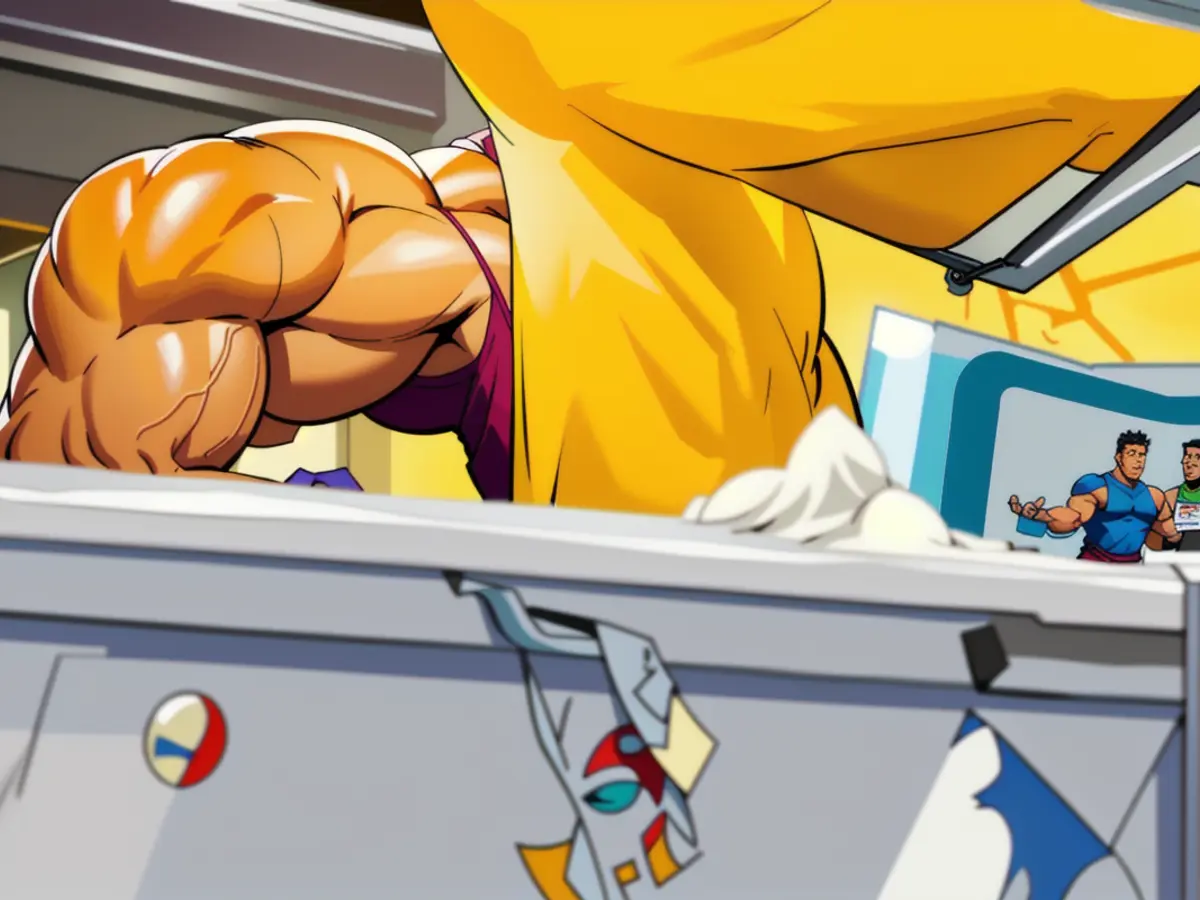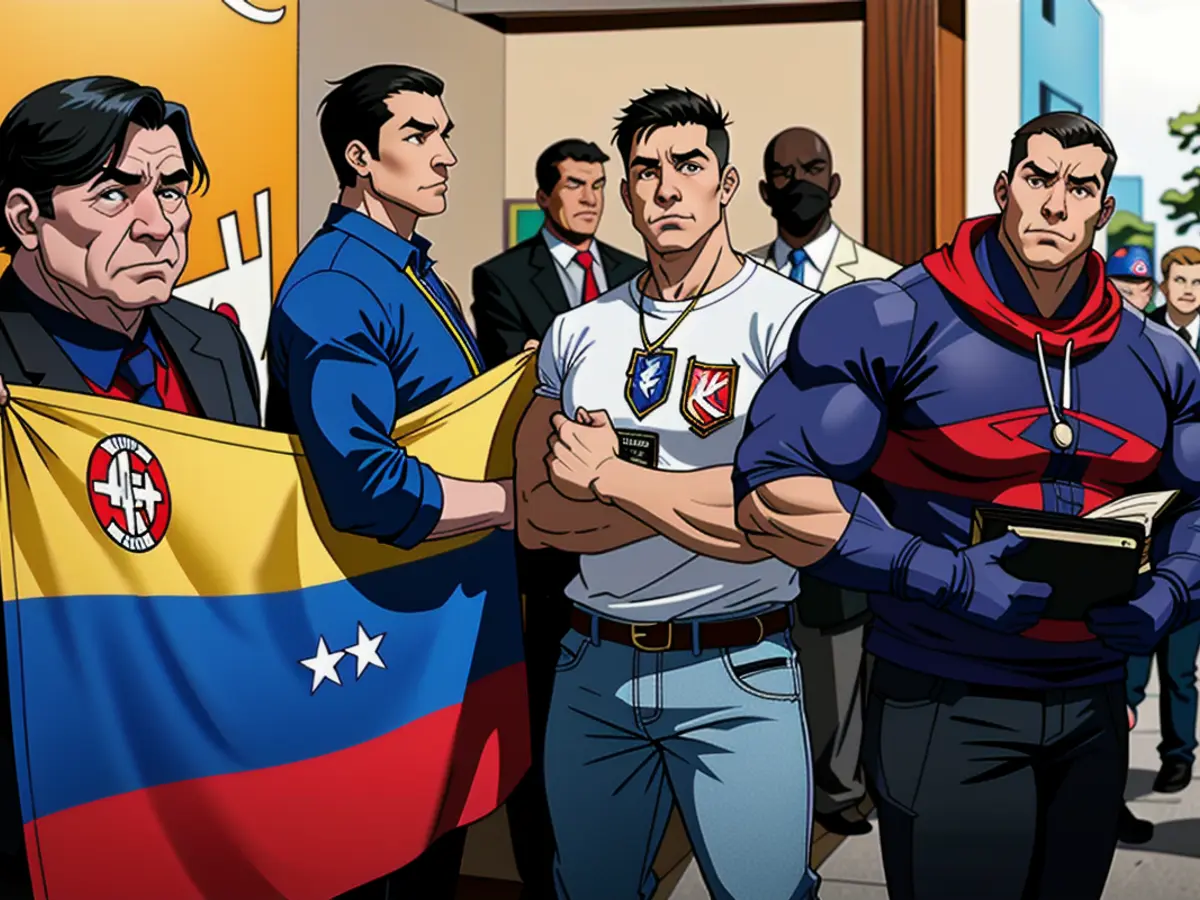Swing to Trump support in a South Florida suburb leads to potential deportations for numerous residents
South Florida's Venezuelan community has long gathered at the authentic Venezvuelan spot, El Arepazo, to celebrate life's milestones.
This spot has witnessed excited Venezuelan flag waving in celebration when President Joe Biden announced deportation protections for Venezuelan immigrants four years ago, and boisterous rallies in support of the Venezuelan opposition, as they anxiously followed election results back home.
However, the lunchtime crowd has dwindled since President Donald Trump's administration moved to revoke their temporary status that allowed hundreds of thousands of Venezuelan immigrants to stay legally in the US, and announced an agreement with the country's authoritarian government to restart deportation flights.
"You can feel the fear," said Daniel Oropeza, a Temporary Protected Status (TPS) holder whose entire family is now facing the threat of deportation, while sitting on the restaurant's patio. "You stop doing things that you normally did before because you don't know for certain if in a couple of weeks you're going to be able to remain in the country."
Trump's move has sparked anger in the Miami suburb affectionately known as "Doralzuela," home to more Venezuelan immigrants than any other city in the United States. Venezuelan Americans helped deliver Trump a resounding victory in the city, where his margin of victory grew by about 20 percentage points from 2020 to 2024. Voters from the community said they appreciated Trump's tough stance on human rights abuses in their homeland—and didn't expect him to deport their relatives.

Noel Ginestra voted for Trump, but now his sister, who is a TPS holder, is facing possible deportation. Although he still supports the president, he said he hoped the TPS revocation would be blocked in the courts.
"I supported him, but it disappointed us that he decided to end TPS," Ginestra said, referring to the Venezuelans. "It bothered us that he put everyone in the same bucket."
The unease of the Venezuelan American voters illustrates the larger political risk Trump is taking by moving to revoke deportation protections for certain immigrant communities, even as Latinos leaned rightward in supporting his reelection campaign.
The Trump administration has justified the revocation of protections by stating that conditions have improved in Venezuela and that doing so will enhance public safety. Homeland Security Secretary Kristi Noem recently stated on Fox News that the Biden administration's move to extend protections meant immigrants "were going to be able to stay here and violate our laws for another 18 months - and we stopped that."

Concern over Trump's TPS decision is particularly acute in Doral, which has seen significant population growth in recent years, thanks in part to the 27,000 Venezuelan immigrants who now make up over a third of its population. One of its largest employers is Trump's Doral golf resort, which he's visited multiple times as president.
Minutes away from the golf course, Venezuelan Americans frequent El Arepazo for its delicious arepas and a reminder of home. The restaurant's walls are adorned with prints of Venezuelan newspaper front pages chronicling the country's tumultuous history. A statue of Venezuelan independence hero Simón Bolívar stands in the parking lot, looking out over SUVs and sedans.
Following the administration's initial TPS retraction announcement, community leaders gathered at El Arepazo to condemn the decision.
Adelys Ferro, the head of a Venezuelan advocacy group, declared at a press conference in front of the restaurant that the local community had been "betrayed" by Republicans. "They used us," she said. "They actually told us that he was not going to touch the documented people."

Multiple groups of TPS holders have sued the Trump administration in an attempt to overturn the revocation, arguing that it was "arbitrary and capricious." Judges have yet to rule on the case, although similar lawsuits delayed Trump's efforts to end TPS protections for other nationalities during his first term.
In Doral, a divide is growing between Venezuelan Americans who are still holding out hope that Trump will change his mind, and others who believe he will stay steadfast.
"I want to believe that in the next weeks or in the next month, he will take a decision with his team that will help us," said Johanna Lazarde, a TPS holder who says she still supports the president.
But not everyone agrees. "I think they're probably going to double down on it," Oropeza said.

After Trump's decision, a mother fears for her son
TPS has been used for decades to protect people already in the US from deportation when their homelands have faced armed conflict, natural disasters, or unsafe conditions. Both Republican and Democratic administrations have extended protections for immigrants from certain countries, though some Republicans have argued the program—intended to be temporary—has gone on for too long.
The Biden administration first granted TPS for Venezuelans in March 2021, citing increased instability in the country. Two weeks before Trump took office, the Biden administration renewed protections for an additional 18 months.
But Secretary Kristi Noem quickly reversed that move. Under Noem's order, protections will end for about 300,000 Venezuelan TPS holders on April 7, after which they could be deported. Another roughly 250,000 Venezuelan immigrants who arrived in the US before 2023 are set to lose their TPS status in September.

In a memo, Noem stated that there have been notable improvements in several areas such as the economy, public health, and crime in Venezuela—a stance that has angered Venezuelan American activists who have strongly opposed President Nicolas Maduro.
In his first term, Trump took a hard line against Maduro, who has jailed opponents and overseen torture and extrajudicial killings, according to human rights groups and a UN fact-finding mission.Trump recognized an opposition leader as the country's rightful president in 2019 and imposed sanctions against the regime. So far in his second term, Trump has vacillated over Maduro, with his administration coming to an agreement with Maduro's government to restart deportations to Venezuela in January, but more recently ending a deal that allowed Chevron to export oil from the country.
Already, the Trump administration has started detaining Venezuelan immigrants at Guantanamo Bay Naval Base in Cuba. Officials said that people kept there include the "worst of the worst" members of Tren de Aragua, a transnational gang—although some of those sent to Guantanamo were deemed by federal authorities as low-to-medium threats, according to court documents. They were deported to Venezuela last month.
TPS holders in Doral say they're living in fear that their families will be next—and some argue that if they are sent back, there's a chance they will be killed or jailed.

While living in Maracaibo, Venezuela, Carol Durán Pérez had faced harassment for years from a pro-Maduro militia and the country's intelligence agency due to her opposition to the government, she said. She arrived in Florida in 2021 with her son for what she thought would be a family vacation lasting a few weeks.
But while she was in the US, the threats against her family increased, and Durán Pérez said she felt she had no choice but to stay "because my life was in danger, and my son's too." Receiving TPS status gave her a chance to build a future in the US, she said.
When Trump won in November, Durán Pérez said she was happy because she thought he was a stronger leader than Biden—and didn't expect him to undo the TPS extension approved under the previous administration.
"I totally agree that they should pursue Tren de Aragua and that they should leave this country," she said. "The surprise was that the measure was against all Venezuelans," including "hard-working people, professional people who contribute a lot to this country."

Now, some of the things Durán Pérez loved about living in Doral—like a school in walking distance for her 13-year-old son—consume her with fear. She's stopped letting him play at a nearby park on weekends.
"That they'll pick him up—I think that is the worst fear I have, that it might happen when I am not with him, or he is not with me," she said, her voice breaking.
Like many TPS holders, Durán Pérez has applied for political asylum, but asylum cases typically drag on for years, with some people waiting a decade or more in uncertainty about the outcome.
Immigration lawyers in Doral say they're struggling to handle a wave of cases from people who are desperately looking for a pathway to stay in the US after April.

"Our phone has been on fire," said Ros-Ana Guillen, an immigration attorney who is representing hundreds of Venezuelans, including some with TPS. "There are actually people sobbing on the other line, crying and scared for their family members. I have around a thousand WhatsApp messages, around a thousand texts that I haven't been able to respond."
Immigration move could devastate a local economy
Officials in Doral—a community where seemingly everyone has a friend, family member, or neighbor with TPS—are ringing the alarm about the disastrous impact that mass deportations would have on the city.
Maureen Porras, the Doral Vice-Mayor who recently left the Democratic Party to become a Republican, said that the city's economy would grind to a halt if local TPS holders are deported. Because TPS comes with employment authorization, many businesses in Doral are dependent on Venezuelan employees who are set to lose their legal status in weeks or months.

Porras said that the TPS decision could also hurt the Trump Organization's plans to build four luxury condo towers overlooking the president's Doral golf course. "I think that it could potentially impact them in looking for service workers or people that are going to perhaps buy their condos and also work within that project," she said.
Already, some businesses in Doral, including El Arepazo, say they're seeing fewer customers in recent weeks, which they attribute in part to Venezuelans without permanent immigration status staying home out of fear.
City Councilman Rafael Pineyro, the only Venezuelan member of the council, voted for Trump in November. While he opposes Trump's TPS move and initial steps toward rapprochement with the Maduro regime, he said he believed the president needed to make drastic moves in response to Biden's less restrictive immigration policy.
"I don't think that we have to enter in some type of confrontation with the administration at this point, or making demands," Pineyro said. "I think it's more about working together."
Pineyro authored a resolution that the city council passed last month calling on Trump to find a solution allowing law-abiding TPS holders to stay in the US, and said he hoped the president would make a move to do so before the April deadline. If he didn't, Pineyro said, there could be electoral consequences for Republicans in Florida's congressional elections next year, because the Venezuelan American community is "going to be diligent and pay attention" to how the GOP responds to the TPS revocation.
A bipartisan group of Florida congressmembers has introduced a bill to grant permanent legal status to some Venezuelan immigrants, although it's unclear whether it has any chance of passing.
Back at El Arepazo, Oropeza, the TPS holder, said he was trying to take the uncertainty he was facing about his future day by day. Asked about what he thought of his community's support for Trump, he said he didn't have a problem with the president's intentions to deport criminals.
"But I don't feel like he should punish the vast majority of us who are hard-working people who have dreams and hopes and just want to provide for our families," he said. "I don't think this is the right decision if he wants to bring stability back into the country—or if he wants to continue to have the support of our people."
- The fear among Venezuelan Americans in Doral, who are TPS holders, is palpable as they face the possibility of deportation under President Donald Trump's administration.
- The Trump administration's decision to revoke the temporary status of Venezuelan immigrants has sparked controversy, with some questioning the validity of the improvements claimed in Venezuela, such as economic, health, and safety improvements.
- Despite supporting President Trump in the past, Noel Ginestra, a TPS holder, finds himself at odds with the administration's decision, hoping for the revocation to be blocked in the courts.







